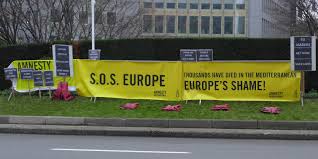By Mara Braslava
Managing Editor
In October more than 300 people heading form North Africa to Europe lost their lives near the Italian island of Lampedusa. In the past two decades more than 20,000 migrants have died while crossing the Mediterranean, making the sea comparable to a graveyard. The latest tragedy has finally attracted attention to the deaths occurring at the border of the EU posing the question – who is responsible for this human tragedy?
Unfortunately the Mediterranean is only one example revealing the deadly flaws of European immigration and asylum policies. The Common European Asylum System (CEAS) has turned out to be seriously counterproductive in regard to its goals – to secure that asylum seekers have equal chance of being granted legal protection across EU member states and to distribute “the burden” evenly between the EU countries. Instead, it has deprived many of a fair asylum procedure thus violating the Geneva Convention relating to the Status of Refugees that safeguards the access to a fair asylum procedure.
The most critiqued parts of CEAS are the Dublin Regulation, a law that determines the EU country responsible for an asylum claim, and EURODAC, a fingerprint database storing data of all potential asylum seekers who enter the EU from third countries. The Dublin Regulation was designed to provide a fair and efficient asylum system, avoid applicants lodging claims in more than one member state and distribute the applications evenly across the EU. However, the actual and more implicit goal was to prevent migrants from heading to the more prosperous Western and Northern European counties.
Since the Regulation states that an asylum application has to be submitted in the member state of entry in the EU, many people are forced to lodge their claim in countries where they do not want to stay and where the authorities are unable to provide a fair procedure. EU external border countries like Greece, Italy and Malta have already announced they are not able to deal with the immigrant flows. Studies have shown that consequently these border countries are more likely to reject asylum claims or to not process them at all. Most migrants try to avoid lodging their asylum claims in, for example, Italy and Greece because of the aforementioned reasons. Therefore, the number of those who choose to cross the border illegally has increased – thus making the entry to Europe more dangerous and giving more opportunities to people-smugglers, document-forgers and other criminal actors.
The CEAS is not only problematic in regard to the EU border countries. People who are detected as “illegals” in any EU member state have their fingerprints sent to EURODAC. If a match is found, if their fingerprint has been first registered in another country, they are deported to the respective member state. Whether there is time to appeal the decision differs between member states. According to Eurostat, in 2010, Italy, Greece and Spain received the most deported migrants.
In 2011 the European Court of Human Rights had already suspended deportations of asylum seekers to Greece. However, the Council of the European Union has rejected an amendment to the Dublin Regulation stating that no deportations can be carried out to countries that are not able to guarantee fair treatment to asylum seekers.
The treatment of migrants is an issue that is not limited to Southern Europe. One does not have to look as far away as Italy or Greece to understand the deficiencies of CEAS and the way asylum seekers or immigrants are treated in Europe. Hundreds of people with no legal status live on the streets or are locked up in detention centers in the Netherlands. Every time one of them leaves for another EU country and is detected there, he or she is sent back to the Netherlands. The Netherlands is also one of the main countries deporting people under the Dublin Regulation.
The treatment of the “undocumented” people by the authorities like police and border patrols is striking as well. Being an irregular migrant has become something equal to committing a crime. These people are living on the streets. Their camps and settlements are being evicted. They are regularly checked for I.D. on a racial basis and after subsequently being detained, are released later only to return to the streets.
One question these “undocumented” people share is why they cannot leave a country is it does not want them – if it does not give them asylum. Even cynically looking from a cost-efficiency point of view, this procedure does not benefit anyone; but what must it be like for the people who are treated like ping-pong balls?
Another common attitude is that no one expected Europe, known for promoting liberty and democracy around the world, to be a place of brutality and discrimination. Indeed, democracy and human rights are considered to be the core values that unify the EU member states. The current asylum policy, however, undermines these principles, which begs the question, are these the actual common values of the European countries? Perhaps xenophobic fear and excessive nationalism are more pervasive European values than tolerance and humanity?
If the later is the case, the moral strength and reputation of the EU is unavoidably in doubt. Yet, little seems to be done to change it as the only reaction of the European Commission to the Lampedusa disaster has been to increase border security, in other words – keep the “problem” outside of the EU.
Mara Braslava, Class of 2014, is a Politics and Sociology major from Limbaži, Latvia.

